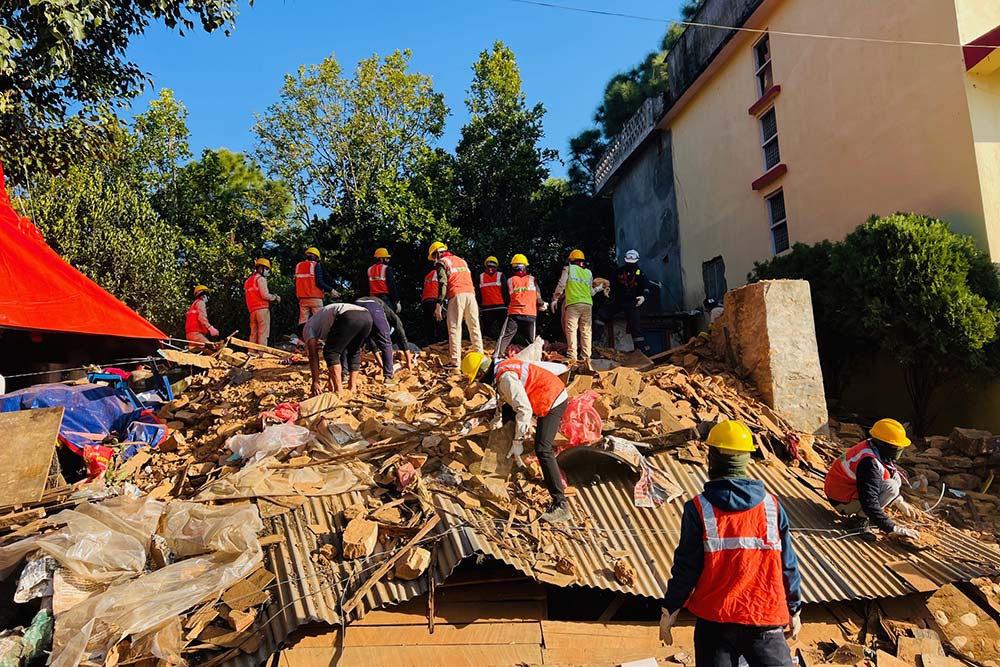
By Rebati Adhikari
Healthcare of Nepal is still entangled in between three issues- availability, accessibility and affordability. Clause 1 of Article 35 of Nepal’s new constitution states every citizen shall have the right to free basic health care and none shall be deprived from emergency services. But reality speaks otherwise. Health care is expensive and a huge chunk of people are still out of the reach of health services particularly in remote areas of the country. Shortage of medicine and doctors has been a perennial problem when it comes to the health care in rural Nepal. This is where the free health camps compensate.
Free health camps are garnering popularity not only in rural areas but also in the urban cities like Kathmandu. It may have something to do with Corporate Social Responsibility (CSR) to promote brand image of various companies. But what then happens to the major purpose of organising such camps? Are the real needy being benefitted? And can this be a viable answer to the health care demand of the population?
Are Health camps necessary?
Health camps have been an annual event of Himalayan Quests (HQ) Foundation since 2013. They have organised health camps in Syangja, Solukumbhu and Rasuwa. “Health services are costly and beyond the reach of the poor. So we make sure that the poor are benefitted from our services. We have built strong relations with the local bodies of Syangja who help in the process to ensure underprivileged groups take advantage of our health camps. Service seekers have requested us to bring such camps every six months which attest to its value,” says Amrit Ale, Founding Director of HQ Foundation. Pratik Tewari, Head of Marketing and Business Development at Grande International Hospital says, “On a broad spectrum the main goal is to help the community and extend care to those who cannot afford health services or make it to the hospital.” Grande organises both internal and external health camps; it has organised 50 health camps in the last two years. “It is the need of the rural community of the country. There are some people who have never visited a hospital in their life. Health camps caters to their needs,” says Dr. Laxmi Prasad Ghimire, Program Manager at Volunteer Initiative Nepal, who is also a General Physician and Public Health Specialist. Volunteer Initiative Nepal (VIN) is a nonprofit organisation which organises several community empowerment programs, and health camps being one of them.
Are they effective?
“Health camps have two basic goals- people from rural areas rarely get access to health specialists which is an opportunity that health camps provide, and it gives specific data on the health status of a particular place,” states Ghimire. Tewari believes that in terms of creating health awareness these health camps are very productive but as they penetrate deeper into the rural areas, the expectation for medicines increases. Patients come in large numbers during such health camps not just for the treatment but mainly for medicines. “We cannot blame them either. The surroundings and upbringing has shaped them in that way so the intended purpose hardly gets served,” states Tewari. “Of course, there are benefits but each organisation has its own way of organising such camps. It depends on the hidden goal of the camp. Every district has a distinct problem, some districts lack health assistants, some districts have enough medicine supply yet needy people are not getting it but the major problem is lack of awareness and that is where we are contributing,” informs Ghimire. “Doctors have limited time. But there is never-ending queue of patients so things might go amiss. Health camps are just for general screening. Sometimes, patients get lucky when a complication gets noticed. We can’t spend much time on every patient. Treatment is not possible. The camp only identifies the health problem,” says Binaya Regmi, doctor at Grande International Hospital. Meanwhile Ale thinks for the success of such camps follow-up is a major ingredient, that’s why they are taking camps only to few places so that at least few beneficiaries get effective treatment.
[/vc_column_text][vc_row_inner][vc_column_inner width="1/4"][vc_column_text] Amrit Ale
Founding Director, HQ Foundation
“Service seekers have requested us to bring such camps every six months which attest to its value.”[/vc_column_text][/vc_column_inner][vc_column_inner width="1/4"][vc_column_text]
Amrit Ale
Founding Director, HQ Foundation
“Service seekers have requested us to bring such camps every six months which attest to its value.”[/vc_column_text][/vc_column_inner][vc_column_inner width="1/4"][vc_column_text] Dr. Binaya Regmi
Grande International Hospital
“We can’t spend much time on every patient. Treatment is not possible. The camp only identifies the health problem.”[/vc_column_text][/vc_column_inner][vc_column_inner width="1/4"][vc_column_text]
Dr. Binaya Regmi
Grande International Hospital
“We can’t spend much time on every patient. Treatment is not possible. The camp only identifies the health problem.”[/vc_column_text][/vc_column_inner][vc_column_inner width="1/4"][vc_column_text] Pratik Tewari
Head of Marketing and Business Development, Grande International Hospital
“On a broad spectrum the main goal is to help the community and extend care to those who cannot afford health services or make it to the hospital.”[/vc_column_text][/vc_column_inner][vc_column_inner width="1/4"][vc_column_text]
Pratik Tewari
Head of Marketing and Business Development, Grande International Hospital
“On a broad spectrum the main goal is to help the community and extend care to those who cannot afford health services or make it to the hospital.”[/vc_column_text][/vc_column_inner][vc_column_inner width="1/4"][vc_column_text] Dr. Laxmi Pd Ghimire
Program Manager, Volunteer Initiative Nepal
“It is the need of the rural community of the country. There are some people who have never visited a hospital in their life. Health camps caters to their needs.”[/vc_column_text][/vc_column_inner][/vc_row_inner][vc_column_text]
Dr. Laxmi Pd Ghimire
Program Manager, Volunteer Initiative Nepal
“It is the need of the rural community of the country. There are some people who have never visited a hospital in their life. Health camps caters to their needs.”[/vc_column_text][/vc_column_inner][/vc_row_inner][vc_column_text]





